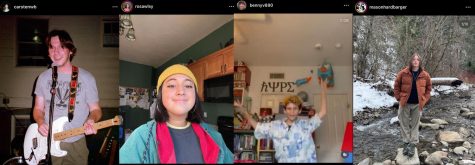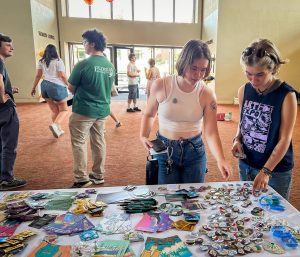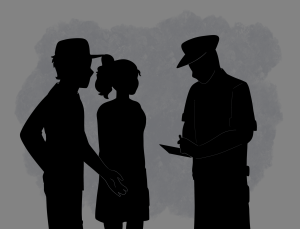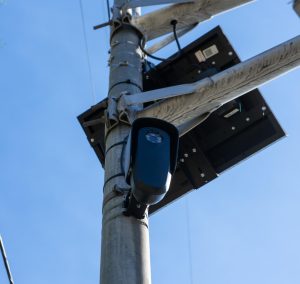Campus celebrities: they’re just like us!
March 9, 2023

At a school of Whitman’s size, certain notable characters are bound to surface. It’s not difficult to gain some name recognition or spark brief campus-wide conversation. What happens, though, to those who emerge as near celebrities among the student body — especially as social media inflates their popularity? Let’s check in with a few of our “campus celebrities,” and explore the perks and the pitfalls of Whitman notoriety.
First-year Mason Hardbarger was shocked when I reached out for an interview. As I am relatively disconnected from the class of 2026 social scene, I’d called upon a few underclassmen who identified Hardbarger as their resident celebrity.
“I feel like I just am some guy,” Hardbarger said. “I just go about my day.”
Hardbarger regards themself as a social person who delights in conversation — in fact, they rushed in straight from a conversation with a Jewett hallmate.
“Something I value a lot is being able to walk up and have conversations with people … No matter how well I know them, it’s just really cool to me. I like listening to people.”
Thanks to connections made over social media, Hardbarger entered Whitman with an existing network of friends. Once they began spending time with fellow Jewett Hall residents, their social circle tripled. Jewett, known as Whitman’s most social dorm, is an extrovert’s haven: people tend to be social, outgoing and eager to get involved. Hardbarger themself is pretty involved, having dabbled in all sorts of clubs and activities: ultimate frisbee, attend Whitman Mutual Aid Club and they’re a regular at Residence Life Jewett programs.
Still mere months into their Whitman career, Hardbarger is simply enjoying being a well-connected person and trying “not to get a big head about it.”
Their friends might lend some help in that respect:
“My friend … was like, ‘You know, at the beginning of the year, I guess you were like a campus celebrity,’” Hardbarger recounted. “‘But then I got to know you, and I realized you’re just some guy.’”
The easiest way to describe sophomore Carsten Wallace-Bailey as a figure in the Whitman universe might be ubiquitous. You’d be hard-pressed to find a student unable to name and recognize him. Despite his underclassman standing, Wallace-Bailey has found himself in a number of campus-facing roles in his time at Whitman. He plays guitar for popular student band The Wind-Up Birds, sings in the campus a cappella group The Tones and makes occasional appearances in student theater productions. He plays for multi-sport intramural stronghold Lumpy Ballz and recently became an RA for Lyman House. Wallace-Bailey also considers himself extroverted and friendly, and he enjoys a large social circle.
“I like knowing people. I enjoy it,” Wallace-Bailey said. “I think I’ve kind of garnered a reputation as someone that people like, which I also appreciate because who doesn’t want to be liked [and] also I try to be as friendly as I can to people. I enjoy being friends with as many people as I can.”
As for the concept of campus celebrities and his status as such, Wallace-Bailey considers it patently stupid.
“I think ‘campus character’ is better than celebrity because there’s not a real celebrity culture,” Wallace-Bailey said. “I think ‘celebrity’ implies that someone is revered … I don’t think that happens at a school that’s less than 2000 students. Maybe at giant universities where they have a star basketball player that’s gonna go pro — maybe that might be considered a celebrity. I don’t think that exists at Whitman.”
Celebrity or character, Wallace-Bailey is a pretty incontestable example. He can thank his general sociability for his Whitman stature, but social media seems partially responsible for his propulsion into a larger-than-life phenom. I’m being facetious with my choice of words here, but open anonymous message board YikYak and you might mistake Wallace-Bailey for a figure of international renown. While the Yak’s campus presence has died down significantly, the spring semester of 2022 saw mass profusions of Wallace-Bailey yaks.
The yaks began with name-based wordplay (“She Carsten on my Wallace till I Bailey” was a YikYak all-timer, as far as I’m concerned) and pivoted quickly to remarks on Wallace-Bailey’s general prominence and pleasant disposition. This level of anonymous attention could quickly breed discomfort, but luckily, Wallace-Bailey didn’t mind.
“I just think it’s funny,” he said. “I really do think it’s funny. People aren’t saying bad things about me on YikYak like they do about some people. I won’t pretend it doesn’t feel nice to have anonymous strangers, theoretically, saying nice things about me. But also, I think it’s a good representation of the way that I try to represent myself.”
Junior Benny Vasconcelos, on the other hand, certainly feels some discomfort with his Whitman notoriety. Unlike Hardbarger or Wallace-Bailey, Vasconcelos doesn’t identify as an extrovert, preferring to keep his social circle relatively small. As a result, his campus fame confounds him.
“I just feel like, okay, I’m being myself,” Vasconcelos said. “It’s just kind of surprising to me that people feel like I bring all this energy; I don’t feel like I bring all this energy. I just feel like I’m being myself.”
So what’s the source of his celebrity (a term at which he, like most of my interviewees, chafes)? There are a few answers.
First, despite his self-perception, Vasconcelos is an exuberant and tremendously friendly person. He must have greeted half a dozen people during our conversation, and he sang fervently along to Gotye’s “Somebody That I Used to Know” when it came on over the speakers.
“Sorry,” he said when he began to sing ahead of the track. “I just get too excited!”
Adding to his vivacity is a wacky and jam-packed social media presence. Vasconcelos cycles through obsessions with different celebrities and chronicles these phases on Instagram. As an underclassman, he photoshopped himself into pictures with the Jonas Brothers, captioned with screaming uppercase and gratuitous emojis.
Arriving at Whitman, Jonas Brothers paraphernalia in tow, he worried that he might develop an unappealing reputation. Quite the opposite: his peers appreciated his earnestness and humor, and he felt very supported. His Joe Jonas cutout eventually gave way to a Joe Keery shrine plastered to his wall and an accompanying slew of edits uploaded to his Instagram page. His current obsession is Larry, the portmanteau fan theory that ex-One Direction members Harry Styles and Louis Tomlinson have concealed a covert decade-long relationship.
“If I can do anything with my microcelebrity status, it’s make people believe in Larry, because it’s true,” Vasconcelos said. “The Wire, this is true. Please leave this in the article.”
Despite his unwavering devotion to Larry, he has recently scaled back his posting, finding that it brought him a level of attention that made him uneasy. More than anybody else I spoke with, Vasconcelos is acutely uncomfortable with the idea of being a campus celebrity, despite the admitted ego boost.
“[I don’t like] the idea that people are watching me and, I don’t know, expect something of me,” he said. “I just want to start with a fresh slate and not have to worry that people already have preconceptions of me.”
The leading preconceptions, according to Vasconcelos, are that he is high-energy, funny and happy — all flattering assumptions, but not the full picture. Vasconcelos often feels pressure to perform this persona in order to avoid letting people down.
“It just kind of makes me feel like I’m being fake and plastic,” Vasconcelos said. “It makes me feel super good that I’m able to make other people happy, spread positivity and all that. I just don’t like the term celebrity. I guess I just want to be Benny, the guy who makes people happy. I just don’t want all the attention.”
Senior Rosa Woolsey has her own qualms with her campus celebrity status, describing the whole phenomenon as decidedly “icky.” But, she does feel largely well-represented by the way virtual strangers might perceive her. She’s gleaned that people tend to see her as silly, easygoing and generally optimistic, a cluster of traits that feels pretty consistent with her own sense of self.
“I don’t necessarily feel like ‘everybody knows one Rosa but there’s a secret Rosa within me,’” Woolsey said. “I feel like I am a pretty open book and pretty honest with people about who I am and how I want to represent myself.”
Even though her “persona” feels accurate, it’s still just that: a persona.
“I’ve tried to unpack it. There’s not a lot to actually unpack; it is just generally kind of weird,” she said. “I think that where it can get kind of dicey is the way in which it can impact the way that you think about yourself, the relationship that you have with yourself and how much your social identity impacts your self identity.”
Woolsey found that the best way to deal with it is to avoid giving it too much thought. For all the journaling and rumination she’s done, it hasn’t really gotten her anywhere. Spending last fall abroad in Indonesia was a welcome respite from social stressors and reminded her that they only really exist within Whitman’s 117 acres. She’s also learned to be candid about her social standing.
“It’s a fine line,” Woolsey said. “You have to be realistic about how people have told you they’re perceiving you, but you also can’t be an a-hole about it. I don’t go around talking about how popular I am because that would suck. But, I also can’t pretend that I have a different social standing than I do in a backwards effort to remain humble when it’s actually just a humble-brag situation.”
Woolsey supposes that social media has played a pretty significant role in the way fellow students perceive her. Her trademark Instagram presence is instantly recognizable: Woolsey’s captions, which frequently bump up against the character limit and function like short-form blog posts that contextualize her photos.
“There have been times where I’ve met people for the first time and then they’re like, ‘Oh, yeah, I follow you on Instagram,’” Woolsey said. “It’s a little bit weird because I know that their idea of me is the persona and not actually me. It’s weird when they’re talking to me, but they’re not actually talking to me. They’re talking to the idea of me.”
As for the prominence of the campus celebrity at Whitman, Woolsey has an optimistic take.
“Maybe at Whitman, we just talk about it a little bit more because what we’re trained to do here is to socially analyze ourselves, note patterns and [observe] structures of social power,” she said. “It totally makes sense that we would make these connections and talk about it.”
Campus celebrity culture is undeniably odd. Is it just collegiate repackaging of high school popularity? Harmful idealization of our peers? If I’ve learned anything from our four resident “celebrities,” it’s to shed the title altogether — that’s the only way to truly connect.







An Old Alumna • Mar 12, 2023 at 6:02 pm
Nicely written! As an alumna for whom everyone seemed to know for being a loud queer, there were definitely good parts (as in people knew I was a safe person to go to) but it did feel strange as I wasn’t really trying to be known, I was just doing my life as I wanted it. Especially being someone not “popular” in high school, I never really knew what to do with it ya know?
Grace • Mar 9, 2023 at 6:25 pm
Excellent article Zoe